| Srl | Item |
| 1 |
ID:
076455
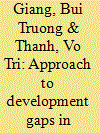

|
|
|
| 2 |
ID:
140009
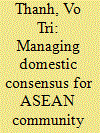

|
|
|
|
|
| Summary/Abstract |
Ever since the policy of economic renovation (Doi Moi) was initiated in 1986, comprehensive domestic reforms and proactive economic integration have been major pillars of Vietnam’s economy. Deepening cooperation and integration through the ASEAN Economic Community (AEC) framework lies at the centre of Vietnam’s trade and investment liberalization agenda. Any domestic reforms undertaken in the lead up to the announcement of the AEC by the end of 2015 should engage the ongoing economic restructuring process as well as the country’s growth paradigm. Reforms will also entail narrowing the development gap between Vietnam and more advanced ASEAN economies. The Vietnamese government has to weigh adjustment costs from reforms and greater liberalization as well as ensure that benefits are distributed among a diverse set of stakeholders in the domestic economy. Past experiences have shown that stakeholders can be sensitive to adjustment costs and accompanying uncertainties. This paper focuses on three key issues related to managing consensus during the community-building process: (i) increasing consultation with stakeholders during reforms; (ii) building community awareness of potential changes; and (iii) mitigating adverse impacts of reforms.
|
|
|
|
|
|
|
|
|
|
|
|
|
|
|
|
| 3 |
ID:
088798
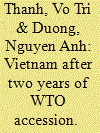

|
|
|
| 4 |
ID:
138139
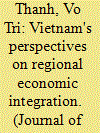

|
|
|
|
|
| Summary/Abstract |
This paper revisits Vietnamese perspectives on regional economic integration. Proactive economic integration has been an important pillar of Vietnam’s economic reforms. The country’s current economic integration process involves preparation for the ASEAN Economic Community (AEC) and the negotiation of ambitious free trade agreements such as the Trans-Pacific Partnership (TPP) and Regional Comprehensive Economic Partnership (RCEP) agreements. As the umbrella organization for Vietnam’s economic integration, ASEAN continues to forge the country’s trade and investment linkages with the region. The AEC is making progress, but certain challenges remain with the overall management of regional cooperation, improvements to ASEAN centrality and connectivity, and issues related to contemporary regional and non-traditional security. RCEP and TPP represent recent ambitious efforts to promote economic integration. Notwithstanding their potential benefits, RCEP and TPP may produce different outcomes, including trade diversion, for major economies. These two trade agreements have various similarities and differences, but they exhibit potential consistency with the concept of a Free Trade Area of the Asia Pacific. Vietnam’s economy may benefit immensely from ongoing integration efforts. Still, such benefits are conditional on relevant and timely domestic reforms, particularly of economic institutions, state-owned enterprises and public investment. The harmonization of commitments under various economic integration tracks and improvements to market confidence is also critical.
|
|
|
|
|
|
|
|
|
|
|
|
|
|
|
|
| 5 |
ID:
062447
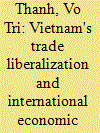

|
|
|